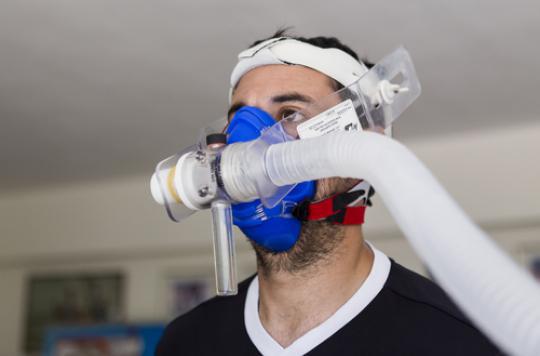British researchers have created a test to detect cancers of the esophagus and stomach, which would allow earlier detection, and only requiring an exhalation.

“At the moment, the only way to diagnose cancer of the esophagus or stomach is endoscopy,” recalled Dr Sheraz Markar, researcher in the department of ontological surgery at Imperial College London. (United Kingdom), during the European Congress of Oncology which takes place in Amsterdam from January 27 to 30, 2017. An invasive medical examination that patients hesitate to perform. The symptoms are also ambiguous, which makes the detection of these pathologies often late, and reduces the chances of survival: at 5 years, they are only about 15%.
These obstacles led Imperial College researchers to imagine a device capable of detecting tumors on the principle of cancer detection dogs, thanks to a test requiring only one breath. “A breath test could be used as a first-line, non-invasive diagnostic method that would reduce the number of unnecessary endoscopies,” added Dr. Markar. In the long term, it would lead to earlier diagnoses, and therefore better survival ”.
Mass spectrometry
Dr Markar presented to the congress a first clinical study carried out on 335 people – 163 with cancer of the esophagus or stomach, 172 healthy for whom an endoscopy had revealed nothing -, evaluating the effectiveness of their device. And the results seem conclusive: the test is 85% reliable, with few false positives and false negatives.
The air exhaled by the patients was analyzed by a technique of mass spectrometry (SIFT-MS), which makes it possible to pinpoint with precision the composition of the gas samples. Five chemical components were observed in particular: butanoic, pentanoic, hexanoic, butanal and decanal acids. The goal is to determine if these compounds can define a kind of chemical signature of cancers.
Colorectal and pancreatic cancer
“Because cancer cells are different from healthy cells, they produce different chemical cocktails,” explained Dr. Markar. Our study suggests that we may well detect these differences, and therefore use a simple breath test that would tell us which patients are likely to have esophageal or stomach cancer, and which are not. not. “
These first results must be validated on larger patient samples, before use as a large-scale medical device. The researchers plan to continue the trial for the next three years by comparing the test results with those of patients who have undergone endoscopies. They hope to test its diagnostic power and its selectivity on a group with a much smaller number of cancers.
At the same time, they are carrying out equivalent research on colorectal cancer and pancreatic cancer.
.















